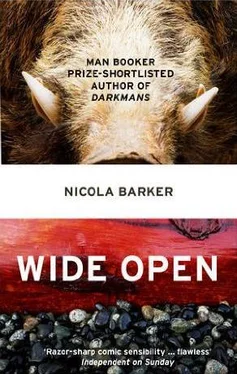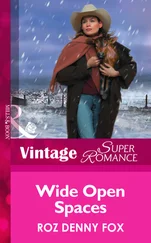“Maybe you should step inside for a moment.”
He pulled the prefab’s door wide. Sara saw the picture of the woman with the high breasts. The woman, she noted, was not particularly attractive, which was good, somehow. Even so, she stood her ground. “No. I can’t stay.”
Lily was right. He did smell of fish.
Luke scratched his head. What should he do? Trouble was the last thing he’d expected here. He’d come for the emptiness. He’d come for an end to people and their associated burdens and stresses.
“Lily arrived home soaking wet,” Sara continued.
Luke nodded. “She jumped into the sea. I was very surprised.”
Sara shifted her weight from one leg to the other. Luke seemed harmless. But it was the harmless ones, she told herself, who were the real danger. Was that logical?
“The thing is…” she cleared her throat, “most of the people who live around here were upset about the nudist beach. It was a concession to the Hamlet.” Sara pointed, uselessly, because it was pitch dark now. “I mean, the fenced-off chalets. And in general the rest of us don’t have that much to do with them. They tend to come and go. Summer weekends mainly. They aren’t what I’d call the community proper.”
“And the prefabs?”
“Pardon?”
“This handful of prefabs. Are we the community proper?”
Sara frowned. Luke was thinking how gorgeous she was. If Sara had suspected, a feather could have felled her.
“I don’t know,” she said slowly, “for some reason we tend to see them as separate.”
She thought for a moment. “I suppose that’s illogical, really.”
“It is illogical.”
“There’s the boatmaker at the end of the line. Two along. He’s permanent. And then there’s the artists down to the left. But they winter in Ibiza.”
Sara felt like she wanted to sneeze. Powerfully. But her nose was clear.
“And next to me,” Luke added, “is Jim.”
Jim.
“You mean the sick one?”
“He isn’t sick. It’s alopecia. It’s a condition. You lose all your body hair.”
“Oh.”
“He’s a nice guy. He keeps my cigarettes for me.”
“Pardon?”
“I gave up smoking, but I’ve entrusted him with a packet just in case. I’m actually purifying. That’s why I’m here. I’m downloading.”
Purifying? Downloading?
Sara stared at the picture again. Luke smiled. “My ex-wife.”
“Really?”
She blushed. Luke noticed. He found it rather touching.
“The only thing I don’t understand,” Sara said, after a short pause, “is why her sandals are unfastened.”
Luke gazed at Sara with a sense of real wonder. And then he said, so softly that she could hardly hear him, in a whisper, “Is it you?”
Sara blinked rapidly. “Is who me?”
He continued to gaze at her, like his face was illuminated from the inside by a high-watt bulb. The glow of it made her step backwards, although she felt in no way intimidated.
“We’ve never met before,” she murmured. “I’m me. I’m Sara.”
And then, as if to contradict everything, a wild laugh flew out of her, so quickly, so unexpectedly, that it had filled each and every corner of the room before her own slow hand could move to mask her lips.
Jim found Ronny on the beach. Ronny was surrounded by several large piles of shells. It was six a.m.
“What are you doing?”
Ronny was engrossed. He spoke slowly. “You know, one minute I was just sitting here, watching the sea, and the next I was sorting out these shells.”
“Sorting them? What for?”
“Into families. Into colours.”
Jim sat down. He took one shell from one of the piles and one from another. He held them next to each other. “I see no difference.”
Ronny inspected Jim’s two shells. “Then you aren’t looking.”
Jim put the shells back down. “So what will you do with them once they’re all sorted?”
“I don’t know.”
“Perhaps you could create something.”
“Like what?”
“People cover wine bottles in them. Or they make shell frogs or shell dolls in shell dresses.”
Jim watched as Ronny picked up the two shells he had just put down.
Ronny displayed them to him. “You put these back on the wrong piles. Couldn’t you tell?”
Jim focused on the shells again. Ronny held them in his left palm. Jim noted, once more, that Ronny’s fingers were strangely waxy at their tips, but also that his wrist had been lacerated. Scars as thick as pale maggots, long scars, nosed out from the dark shelter of his cardigan.
“Maybe there is a difference,” he said, in a spirit of compromise, although if there was then it was so slight that he could hardly detect it. Ronny nodded, gratified.
The squeal of seagulls alerted Jim to the arrival of a woman and a man on a distant section of the beach. They were disrobing. Jim observed them, unobtrusively, from the corner of his eye. Ronny continued to sort the shells, oblivious. The couple undressed completely and then ran into the sea. The cold made the woman yell and the man laugh. Ronny looked up.
“Are they naked?”
“That’s the nudist beach. There’s a sign over there to say exactly where the nudist zone begins and ends.”
“Ah,” Ronny peered over. “I was wondering what that said.”
“Why?” Jim picked up a random shell and placed it gently on to one of Ronny’s piles. “Can’t you read?”
“I can read,” Ronny said, carefully removing the shell and placing it on to another pile. “It’s just that I prefer to read only certain types of lettering.”
“Certain types?”
“I met someone once who worked in printing and graphics. She told me how there were certain kinds of letters that made you feel happy.” He looked into Jim’s face. “You think that’s reasonable?”
“I don’t know. I’m not an expert on lettering.”
“Well, there’s a particular kind of lettering that’s apparently very friendly. And because of the shape of the letters — their roundness, their whole design — they can’t help but make you feel cheerful when you read them. They use them a lot in adverts to make people feel good about certain products.”
“I never knew that.”
Jim was fanning at the beach with his hand, shifting shells aside and revealing the sand below.
“How about,” Ronny said, “you clear a space about as big as a table and then I lay out my shells on it.”
“Like a picture?”
“No,” Ronny spoke gently, but very seriously, “not like a picture, like a table.”
Jim sensed something contract. His face. His mouth. His chest. He felt a dart of panic. Was it a sickness? Then he realized that he was not in pain. It was not uncomfortable. It was simply a smile. A smile. He was smiling. It was nothing to worry about.
It was a real smile and it had started off from somewhere deep down inside him, somewhere numb next to his breastbone. He tentatively touched the spot where the smile came from with his index finger as he shifted forward, clumsily, to clear a patch on the beach. It was all very sudden and rather peculiar. He looked around him, squinting, like he was all at sea in familiar territory.
Nathan had received three letters and he hadn’t responded to any of them. The first came from the authorities, the second from a lawyer, and the third was from a young woman whose name he did not recognize. Connie. An old-fashioned name. It made him think of lavender and starch and thimbles. But her writing was bold, and her demands — which she clearly thought reasonable — struck Nathan as entirely unfeasible. So that was that.
Читать дальше
Конец ознакомительного отрывка
Купить книгу












